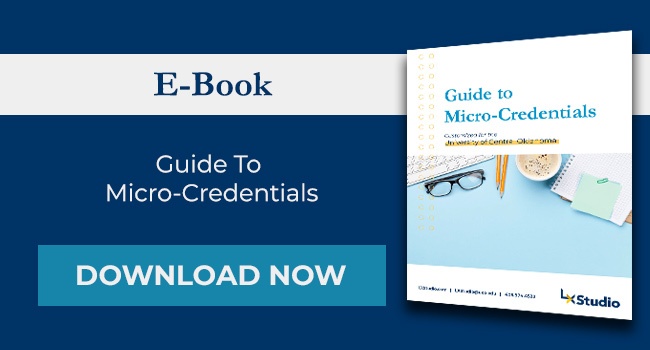
Micro-Credentialing 101: What Are Micro-Credentials and Why Do They Matter for Your Organization?
Technology and the rapid transformation of economies have made it necessary for people to seek new skills.
This all started when online education first emerged in the early 2000s.
With the recession of 2008, workers were forced to seek out new skill sets to survive, as did employers.
With the health scare of 2020, people, once again, had to rethink their educations in order to pay the bills.
For years now, online schooling and other digital resources have met these needs in a number of ways.
But today, workers and companies looking to overcome skill gaps have another educational option at their disposal; micro-credentialing.
Here, we will discuss the meaning of this term, how it became important, and what it can do for workers and employers.
Finally, we'll point you to further resources to help you understand and leverage this exciting new way to bring valuable skills into your organization.
What is Micro-Credentialing?
So, the first question on your mind is probably about the nature of micro-credentials.
Put simply, micro-credentialing is a process by which an individual can earn a micro-credential, or what is sometimes called a mini degree.
These are similar to certifications, as we will discuss later, but there are some important differences.
According to Study.com, micro-credentialing is: "[...] the process of earning a micro-credential, which is similar to a mini-degree or certification in a specific topic area."
Micro-credentials are a way that professionals can improve or enhance their skills and skill sets.
Micro-credentials are small in scope and focused.
What makes them useful is that they represent practical knowledge sets which can be attained, qualified, and set in place quickly.
This enables individuals and organizations to onboard valuable capabilities faster and more strategically.
Here are a few examples of micro-credential titles.
- Leadership
- Business Services
- Computer Support
- Early Childhood Education
- Facilitation Skills
- Financial Literacy
- Food Processing Sanitation
- Grant Writing
- Global Competency
- Information Literacy
- Large Additive Manufacturing
Another common question on this topic might be, "Why do we need micro-credentials when we have certifications and other fast-track learning options?"
The core advantages of these learning options are that they are fast, focused, and economical.
Certainly, other professional learning options can be said to have these advantages, but micro-credentials are optimized to make the most of these benefits.
The Rise of Micro-Credentialing in the Digital Age
But setting those benefits aside, the key to understanding the rise in popularity of these learning options might be to think of them from human resources perspective.
Almost any time you take on a new employee, she or he will have attributes that match the job and organization and attributes that have to be accommodated.
For example, you may be hiring for a secretarial position, and your best candidate has ten years of experience in data transcription.
The interviewer believes her personality is a great fit for the team and the job.
Certainly, her skills will serve her well in the new position, but she lacks experience working at a public-facing location, answering phones, and dealing with client information.
The hiring manager feels confident that she will be an excellent selection, but a few weeks of training by existing staff will be needed.
Instead of holding out for a better fit or spending time and money training her, the hiring manager might ask her to enroll in a micro-credential course that will bring her skills into alignment with the job.
In this case, the company gets the employee it wants without prolonging the hiring process and without committing the time of other employees to her training.
It's an all-round win for everyone, and this is what micro-credentials are all about.
In short, micro-credentialing has been a boon to HR processes.
It saves time, money, and resources, allowing businesses to bring in the right person even if the ideal set of skills is not already in place.
Of course, these benefits are not just for HR but have been a major part of the popularity of these learning options.
To understand the rise of micro-credentials better, let's look at some of the ways they differ from comparable options.
Differences Between Traditional Credentials and Micro-Credentials
Naturally, credentials are a viable, comparable alternative to this relatively new option.
The differences include, but are not limited to:
Time requirement: micro-credentials tend to take less time to complete
- Investment: they tend to be less expensive
- Audience: they are usually more focused, highlighting a very specific skill set
- Scope of training: certificates tend to be broader, while micro-credentials are more focused
- Flexibility: micro-credentials are designed to fill a very specific skill need, making them a great way to fit into a specific role more quickly
- Career options: they often allow talent to move to another position quickly when only a small set of skills is what is required to make the shift
- Acceptance: they are especially appealing to hiring managers and to workers looking to make a lateral change in position, Micro-Credentials are also rapidly becoming accepted as an academic alternative to credentials
- Quality: while no accreditation standards are currently in place for micro-credentials, there is reason to believe that this will change soon
Why Organizations Should Be Thinking About Micro-Credentialing?
The best way to understand practices like micro-credentials is to think of them as a technology.
As such, they have basic attributes that make them especially well suited to making an organization more competitive.
That being the case, we can say with certainty that companies that leverage them will gain a competitive edge over those that don't.
Addressing the Skills Gap in the Workforce
It has long been said that the worst employee is a "good" employee.
This suggests that a worker who does not strive to learn, grow, and deliver more value is a persistent problem that you can never fix because you can't fire him!
This longstanding sentiment shows the timelessness of the problem of skill gaps in the workforce.
But gaps in skills are exactly what micro-credentials are best suited to remedy.
But why?
The reason micro-credentials are ideal is they give the unambitious, "good" employee an easy way to improve by onboarding new skills in a low-pressure way, in their own time.
Indeed, micro-credentials could turn the age-old "good" employee into a great employee!
Keeping Up with Industry Trends and Innovations
As mentioned at the top of this section, failing to leverage the power of micro-credentials means falling behind the curve.
You could leverage every up-skilling practice out there except micro-credentialing and still fall behind your competition.
That's because they fill a critical gap which has been created by modern technology, business culture, and popular trends.
Micro-credentialing is an ideal fit for the psychology of the modern tech-savvy worker. You could think of them as similar to those one-square Lego pieces from your childhood.
They can fit into any space, and you can even make bigger blocks out of them.
In other words, there is always value to be gained by having micro-credential training available.
The alternative to micro-credentialing is to lose your competitive edge in your industry or market.
In the short time these educational products have been available, we believe micro-credentials have proven themselves indispensable in today's business climate.
Enhancing Employee Engagement and Job Satisfaction
Of course, the value of turning a good employee into a great employee cannot be overestimated.
Micro-credentialing does this by giving workers who may never have had a chance to improve their skills to do just that.
It provides upward mobility for the worker who may never have even hoped for such a thing.
Of course, it does the same thing for your ambitious employees as well, lifting all ships equally. When applied in an optimal way, micro-credentialing can be a beautiful thing.
The Advantages of Micro-Credentialing for Students and Employees
The benefits of micro-credentialing for businesses looking to gain a competitive edge are clear.
But it is no-less advantageous for individual employees.
Skill-Based Learning and Career Development
Employees can quickly and effectively learn the precise skills they need to assume new roles, advance, and access better rates of pay.
Flexibility in Learning
Workers can target the exact skills they need to advance their careers.
Perhaps best of all is the fact that they gain clear and concise guidance on exactly how to become more valued workers.
Recognition and Validation of Skills
While academic accreditation is yet to be a part of this learning process, employers can easily track, monitor, and measure the improvements employees make in their skill sets with this learning modality.
Common Myths and Misconceptions About Micro-Credentialing
As with any new mode of productivity, micro-credentialing has its detractors. Here are a few common, and easily rebuffed, objections.
It's Just Another Certificate
Indeed, micro-credentials are similar to certificates of completion/competence.
However, they are more focused on specific skills and knowledge, making them ideal for empowering a worker to deliver specific types of value quickly.
Micro-Credentials Aren't Recognized
Academic recognition is not yet in place for these educational products.
However, wise employers value ability over paper, and that's where micro-credentialing delivers in spades.
It's Too Time-Consuming for Employees
This objection is really just a knee-jerk reaction to a new idea.
In reality, micro-credentialing is the fastest way to impart useful skills and leverage valuable knowledge, benefiting the company, the worker, and the client.
Conclusion
In the final analysis, the advantages of micro-credentialing are easy to understand.
They are educational blocks that are hyper-focused on useful and specific sets of skills and knowledge.
They enable an employer to hire a nearly-perfect candidate and rapidly turn them into a truly perfect new hire.
Micro-credentials can be obtained singly or in chunks to produce larger units of competence over time while enabling an employee to bring real value to the table sooner rather than later.
Micro-credentials give valued workers a clear path to career development, enhancing job satisfaction and boosting engagement.
Finally, micro-credentials are the way of the future.
Organizations that adopt this training modality now will outperform their competition.
They will gain and retain the best talent in their industries, save time, save money, and improve the value they deliver to customers and clients.
At the end of the day, micro-credentials might be something you can get by without.
But you cannot expect to retain a position of leadership in your industry without making use of this new educational product.
To learn more, and get the full scoop on this exciting new learning/training technique, download our e-book, A Guide to Micro-Credentials.
In it, you'll gain critical insights into how micro-credentials differ from similar products, how they are a critical addition to your corporate training efforts and their many advantages.
We're certain that you'll fall in love with this new, advanced take on workforce skill development!
Sources- https://www.maine.edu/student-success/micro-credentials/list-of-micro-credentials/
- https://www.forbes.com/sites/markcperna/2021/10/05/small-but-mighty-why-micro-credentials-are-huge-for-the-future-of-work/?sh=1f9adad302b4
- https://www.brookings.edu/articles/understanding-the-skills-gap-and-what-employers-can-do-about-it/


.jpg)

.png)

